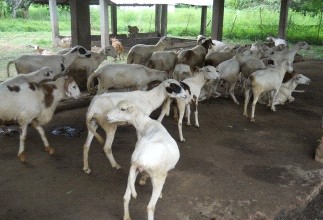Abdoulai G. Dibba
A three-day training on Islamic Macro-Finance principles for Micro Finance Institutions in the Gambia started at a local hotel/resort on Thursday, 25 November, 2021.
The training, which was funded by the Small Ruminant Production Enhancement Project is to equip staff of the two Microfinance institutions identified by SRPEP, on the principles of Islamic Micro-finance in order to help them run the Islamic microfinance credit facility of US$3 million as a revolving fund for the period 2021 to 2023.
In his overview of the project during the opening session, the Project Coordinator Mamud Njie, indicated that the Project aims to contribute to the improvement of the livelihood of pastoral communities in the Gambia, by strengthening the productivity and resilience of rural communities and stimulating business entrepreneurship in the livestock sector.
“Specifically, activities will focus on enhancing small ruminant development through herd health support mechanisms; increase productivity through genetic improvement and improved feed system; production and marketing management; innovation of product processing techniques, and access to Islamic financing, which is the theme for today,” he posited.
Njie said he noted that the project which targets women and youth, is being implemented in the Central River; North Bank; Upper River; Lower River, and West Coast Regions, covering thirty-nine districts in the country.
“The Small Ruminant Production Enhancement Project is funded by the Islamic Development Bank (IsDB) and the Government of the Gambia. The total project cost is US$ 26.81 million of which IsDB contribution is US$ 25.17 million in the form of a loan, whilst the Government of the Gambia contributes UD$1.64 million. The project is executed under the Ministry of Agriculture as the executing agency,” Njie concluded.
Deputising for the Permanent Secretary at the Ministry of Agriculture, Modou Sowe said he noted that access to finance has long been a key challenge for agro-pastoralists and other actors operating in various livestock value chains; thus, the reason why the project has set aside a financing line of up to three million USD in the form of a revolving fund to local Islamic finance practicing Institutions (MFIs), in order to make money available to address their constraints.
Sowe said the financing aims to support smallholder farmers, producers and trader groups more so women and youth; adding that those eligible for financing will include purchase of animals and animal health related operations; downstream meat processing and sales by operators who are members of registered organizations, and individual traders with licences.
“Funds will be provided for the financing of pastoral hydraulic infrastructures such as boreholes and wells; processing equipment and inputs; dairy production including solar panels and coolers; feed production and ram fattening; means of transport and working capital among other activities within livestock value chain,” Sowe said.
“My ministry will give everything to support the implementation of the project and will ensure accountability and transparency in fostering effective management and utilization of the funds for the interest of all Gambian. I appeal to all stakeholders to join us in delivering this noble endeavour.”
The Chairperson of the National Assembly Select Committee on Agriculture, Momodou Cessay, called on Agricultural project implementers to ensure that all projects improve the livelihoods of beneficiaries after their life-span.
After the opening session, staff of the two Micro-finance Institutions namely Supersonicz Financial Limited and ICCU of GTUCCU were trained on the following:-
a) fundamentals of Islamic and rural micro finance;
b) Islamic and rural micro finance;
c) Islamic and rural micro finance products; d) Mudaraba as model of Agri. rural finance; Salam and Parallel Salam; Mudaraba & Musharaka; Diminishing Musharaka; Innovation and Development in Islamic Microfinance Sector; Micro Takaful; Islamic Financing for Livestock Sector; Takaful Products for Rural, Livestock and Agri. Sector; Rural and Agricultural Infrastructure Development through Islamic Finance; Risk Management in Islam Micro-finance and Risk Management of Islamic Microfinance.
Upon completing the three-day training, participants were certificated.


















